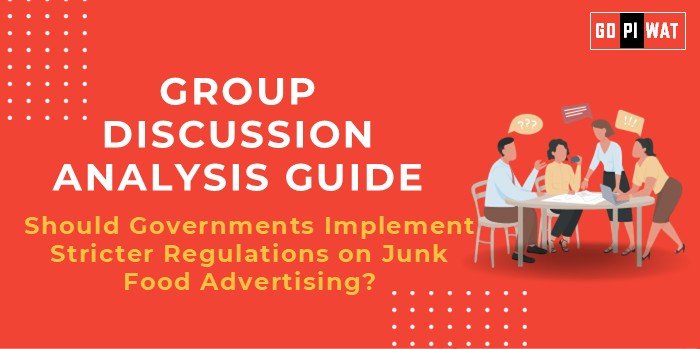📋 Group Discussion Analysis Guide
💡 Should Governments Implement Stricter Regulations on Junk Food Advertising?
🌟 Introduction to the Topic
Junk food advertising, a multi-billion-dollar global industry, significantly impacts public health by influencing dietary choices, especially among children and adolescents. Governments worldwide face increasing pressure to combat the public health crisis caused by poor nutrition, obesity, and related diseases, often linked to aggressive junk food marketing.
📊 Quick Facts and Key Statistics
- 🌍 Global Obesity Rates: Over 1 billion obese individuals worldwide, including 39 million children under 5 (WHO, 2023).
- 📈 Advertising Spend: Junk food companies spend approximately $14 billion annually on advertising targeted at children (Global Nutrition Report, 2023).
- 💸 Economic Impact of Obesity: $2 trillion annually in healthcare costs and lost productivity (World Bank, 2023).
- 🛑 Policy Implementation: 42 countries have introduced legal restrictions on junk food marketing targeting children (UNICEF, 2024).
🤝 Stakeholders and Their Roles
- Governments: Formulate and enforce advertising regulations to safeguard public health.
- Food and Beverage Companies: Innovate healthier products and ensure responsible marketing.
- Consumers: Advocate for healthier choices and demand transparency.
- Public Health Organizations: Conduct research and campaigns on the health effects of junk food.
- Media Platforms: Ensure compliance with advertising norms and promote public awareness.
🏆 Achievements and Challenges
✅ Achievements:
- Policy Success: Chile reduced childhood obesity rates by 6% within 3 years of introducing strict advertising bans.
- Increased Awareness: Campaigns like the UK’s “Change4Life” have improved public knowledge about healthy eating.
- Industry Shift: Some companies have voluntarily reduced sugar and salt content in their products.
⚠️ Challenges:
- Economic Pushback: Advertising bans can impact revenue for media platforms and companies.
- Regulatory Loopholes: Digital marketing often bypasses traditional advertising restrictions.
- Global Comparisons: The US struggles with obesity rates despite voluntary guidelines, while Norway’s comprehensive ban shows significant improvements.
📄 Structured Arguments for Discussion
- Supporting Stance: “Strict regulations on junk food advertising are essential to combat the alarming rise in obesity and associated health costs.”
- Opposing Stance: “Over-regulation can stifle innovation and disproportionately impact small businesses in the food industry.”
- Balanced Perspective: “While regulations are necessary, they must be paired with public education and industry collaboration to ensure sustainable outcomes.”
✍️ Effective Discussion Approaches
- Opening Approaches:
- Statistical Start: “Over $2 trillion in global economic losses are tied to obesity—an issue directly influenced by junk food advertising.”
- Contrast Approach: “While junk food is heavily marketed, studies show that children exposed to healthy food ads make better dietary choices.”
- Counter-Argument Handling:
- Acknowledge opposing views about economic impacts.
- Suggest feasible solutions like incentivizing healthier product marketing.
🔍 Strategic Analysis of Strengths and Weaknesses
- Strengths: Proven public health benefits in countries with bans; aligns with global sustainable development goals.
- Weaknesses: Challenges in enforcement across digital platforms; potential economic pushback from industries.
- Opportunities: Leveraging AI to monitor and regulate ads effectively; collaborating with companies for self-regulation frameworks.
- Threats: Resistance from powerful food industry lobbies; rising influence of unregulated social media advertising.
📚 Connecting with B-School Applications
- Real-World Applications: Marketing ethics and public health campaigns can inspire projects in CSR (Corporate Social Responsibility) and policy analysis.
- Sample Interview Questions:
- “How should governments balance public health priorities with economic interests?”
- “What role can AI play in monitoring junk food advertising?”
- Insights for B-School Students:
- Explore the intersection of marketing and ethics.
- Understand global policy trends for public health.


